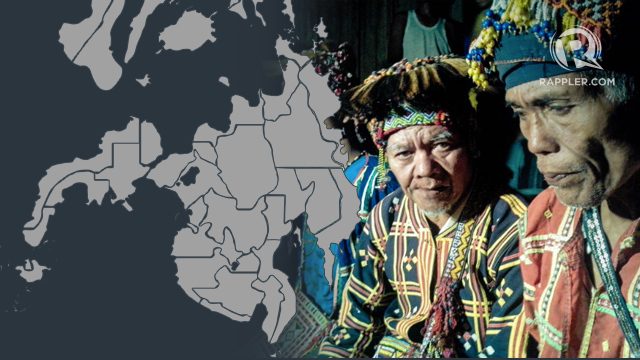SUMMARY
This is AI generated summarization, which may have errors. For context, always refer to the full article.

MANILA, Philippines – Struggles for rights to ancestral lands have long been engrained in the history of indigenous peoples (IP) in the Philippines.
Conflicts have occurred between IP communities and businesses eager to invest in the vast and resource-rich ancestral domains. These have often allegedly resulted in human rights violations and have forced resettlements that have left the marginalized people with nothing.
Disputes have been going on for years in different parts of the country where IP communities are settled. They have complained that their voices are not heard in the bigger arena.
In areas to be covered by the proposed Bangsamoro Basic Law, non-Moro IPs are worried that their rights to their ancestral lands will be compromised due to vague provisions in the bill. (READ: Don’t forget indigenous peoples’ rights in BBL)
To address these issues, International Alert Philippines launched the IP desk in Mindanao, a platform for the impoverished and underrepresented sector to voice out their concerns.
According to deputy country manager Nikki dela Rosa, the IP desk is a product of an EU-supported project which looked into how to strengthen the participation and engagement of the business sector, local government units (LGUs), and the IP community.
These stakeholders play an important role in pushing for actions towards a conflict-sensitive, inclusive, and economic governance on ancestral lands.
“Isa sa mga kailangang gawin ay to really institutionalize that,” she explained. “Kung paano ma-ensure na iyong institutions responsible sa aspect ng economic, government, at IP rights ay ma-involved doon.”
(One of things that needed to be done was to really institutionalize that – how to make sure that institutions responsible for economic, government, and IP rights are involved.)
Not only one-sided
International Alert, however, believes in the importance of getting all sides of the issues. What makes the IP desk special, dela Rosa said, is that the Mindanao Business Council (MinBC) has committed to effectively implement and engage in the initiative.
The Mindanao-based desk will not only serve as a “complaint avenue” of the IP community. It will not be as passive as others, since it will be a “platform for the business sector and the IP community to understand each other.”
“MinBC has a big role in increasing or deepening the awareness of the business sector regarding the local dynamics of IP communities, especially in the Bangsamoro,” dela Rosa said in Filipino. “If these investors are not aware or do not understand these dynamics, whether conflict dynamics or political economy, it can fuel a bigger problem from their part.”
The main stakeholders, the IPs, are open to the idea and see the value of engaging with the business sector – something which may have been previously unpleasant because of past violations.
“It’s really great that the IP communities go into it with a critical mind,” dela Rosa said in Filipino. “They themselves will be able to realize that while it’s important for the businesses to understand them, it’s also important that they understand how these businesses work.”
For the whole Philippines, hopefully
The IP desk will be put in place in areas with “high-risk eruption of violence” due to the abundance of resources that are often subject of conflicts. These are likely to be in Eastern Mindanao and in the Bangsamoro.
But the National Commission on Indigenous Peoples (NCIP) is looking into how the IP desk can be established outside Mindanao.
According to dela Rosa, the engagement of the MinBC may serve as an “inspiration” for other business support groups to be more involved in talks and in respecting the rights of the IP communities in several areas across the country.
“They can also share this with their groups para maintindihan din nila kung ano ang dapat gawin sa Luzon at Visayas,” she explained. (They can also share this with their groups so they can understand what can be done in Luzon and in the Visayas.)
International Alert, together with the different sectors involved, have high hopes for the IP desk despite its early stages. It is “work in progress” after all.
“It won’t be overnight that institutional change will happen so we think that through practice, and through involvement, we can achieve our goals to strengthen the protection of the IPs,” she said.
She continued, “What’s important is that the commitment is there, and there’s openness.” – Rappler.com
Add a comment
How does this make you feel?
There are no comments yet. Add your comment to start the conversation.